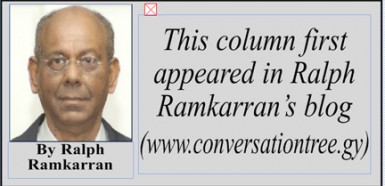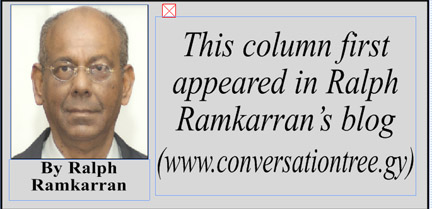The responses of the PPP to The Cummingsburg Accord by APNU and the AFC were a declaration by President Ramotar that it is a “farce” and the unleashing of Ms Elisabeth Harper as its prime ministerial candidate. The first reaction was bravado. The second had real substance. Ms Harper has credentials – ability, integrity, experience, dedication – and her agreement to adorn the PPP’s ticket will add lustre to its appeal. If anything, it is the PPP that will damage Ms Harper’s credibility. The silence they have imposed on her is a mistake. Ms Harper’s qualities need to be on public display.
Having looked at the potential for the opposition coalition last week, some thoughts about the PPP’s prospects may be of interest. Facing the task of recovering lost support after 22 years in office, the PPP’s image badly needs to be enhanced with new faces like Ms Harper’s, however limited the possibilities may be.
In recent times there has been a large influx of a new generation of young PPP and Civic leaders into the government. Some of these include Ashni Singh, Robert Persaud, Frank Anthony, Priya Manickchand, Irfaan Ali, Bheri Ramsarran, Pauline Sukhai, Jennifer Webster, Jennifer Westford and Robeson Benn. Most of these are likely to again serve in a new PPP government if the PPP wins the majority because the PPP has mostly exhausted its supply of young cadres with the talent for ministerial or other high office, while the old faces remain permanent, immovable fixtures. It would not be encouraging for the PPP’s supporters to have to contemplate the same faces for another five years. Therefore, as many new faces as the PPP can attract at this time would be helpful.

Unless the PPP can find a way to deliver its message to the youth who form a substantial portion of the electorate, it would have difficulty in regaining a majority. Rural youth, potential supporters of the PPP, are not enthused and city youth, many from traditional PPP families, are swayed by the AFC. The message against the ‘PNC’ is unlikely to have substantial resonance with youth because they have no experience of the PNCR in office.
In addition, opportunities for both rural and city youth are very limited and have not improved over the past three years. The message that the opposition has obstructed progress is not likely to resonate either, because the PPP has put forward no credible reason why it did not invite a coalition government to involve the opposition in governance.
A campaign based on youth development would be difficult to sustain having regard to the difficulties at the premiere institution established for youth, the University of Guyana. This sector of the electorate is essential for victory and it is only going to be convinced by credible and cogent arguments, not by a raucous platform of abuse, insults, defamation and lewd dancing on stage, or the spectacles of Kwame McCoy and Gail Teixeira dancing on stage to music provided by the Shakti Orchestra, or a ‘dutty wine’ administered by Destra.
But the PPP has given no indication so far that it has learnt the lesson of its loss in 2011. Believing that it was impossible to lose elections again, it allowed its organizational capacity to degenerate. Concluding that it is only its weak organizational output in 2011 that caused its loss, it has worked hard to restore its capacity. But even if it has now improved, organizational capacity alone will not cause former supporters who do not want to vote to change their minds. Organizational capacity will not influence a voter to change his or her support from AFC to PPP. Supporters were dissatisfied in 2011 and it was this that caused the loss, not poor organization. The question the PPP has to ask is: Have we addressed the causes for the dissatisfaction?






